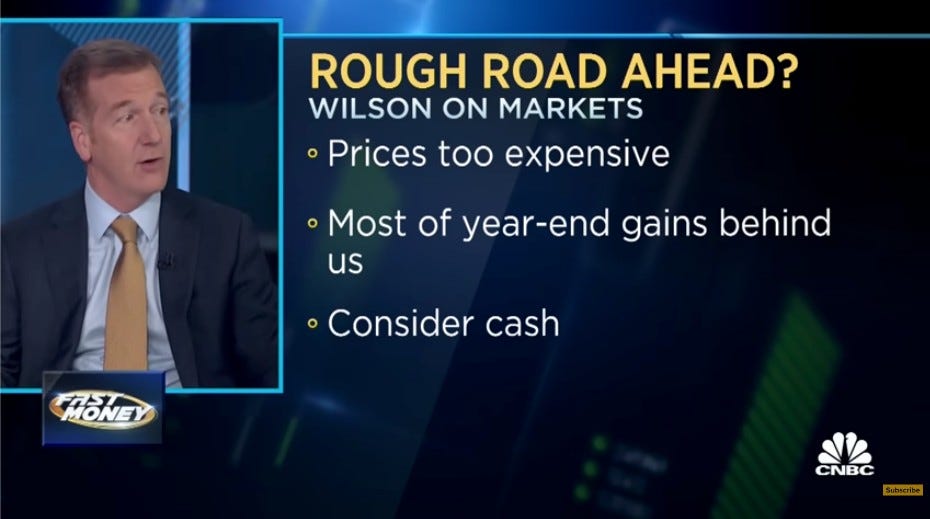Market Review - What You Must Know (Dec 13th)
Inflation worries are subsiding, but the market must now contend with the delayed impacts of significantly higher interest rates and central banks pulling money from the system.
This will be a busy week. November CPI numbers will be released later today and tomorrow, the Federal Reserve will announce their last rate hike of the year. These are the must-know narratives driving the market right now.
Don’t Worry About Inflation, Worry About This
The Short: Year-over-year inflation has been falling since its peak in June this year at 9.1% (down to 7.7% last month). Unfortunately, inflation isn’t what the market should be worrying about right now.

The Long: The bull case for falling inflation is simple - inflation falls and the Federal Reserve lowers interest rates and resumes quantitative easing, the market rises. There are two problems with this.
Fed Chair Jerome Powell has already signaled multiple times that he is well aware of the dangers of loosening financial brakes too early (see Fed Chair Volcker and inflation in the 1970s). Inflation is sticky! Even if inflation trends in the right direction, it’s too early for Powell to lower rates.
The Fed raised interest rates from 0.25% to almost 5% in just 9 months. In tandem, it started quantitative tightening in the summer (i.e. pulling money from the system). It’s well known that the effects of these aggressive policy changes are delayed and many are expecting them to show up in force in the economy next year. More on this below.
So What? The economic damage of significantly higher interest rates and quantitative tightening could show up in the economy as early as the first quarter of next year. This is what matters for the market right now, not inflation.
CEOs Expect Recession While the Market Isn’t Convinced
The Short: A survey published by business-focused think tank The Conference Board in October found that 98% of CEOs were preparing for a U.S. recession in the next 12 to 18 months.
The Long: There is an overwhelming consensus among CEOs that there will be significant pressure on their company’s top and bottom lines in 2023. CEOs are advised above them by economists on the board and below them by economists on payroll. They also have full access and a deep understanding of internal company business and financial data. It’s rare to have an almost unanimous consensus among CEOs on where the economy is headed and this is no coincidence.
So What? With the S&P500 trading at about 18 to 19 times trailing earnings right now, the broader market seems to underestimate business headwinds in 2023 while CEOs are battening down the hatches.
Interview of the Week
Two weeks ago, Morgan Stanley’s Chief US Equity Strategist and Chief Investment Officer went on CNBC to give an interview on where Morgan Stanley sees the market will go next year. We thought this was a great interview with very clear and straightforward predictions
Here are the highlights:
The Federal Reserve will raise rates by 50 basis points in December and 25 basis points in January, then pause.
The market is rallying right now in anticipation of this pause. However, “the question is, what are you going to pay for this thing if you think earnings are going to be really disappointing next year which is our core view.”
Morgan Stanley’s year-end price target for the S&P500:
Bear case: 3,600
Base case: 3,900
Bull case: 4,200
Even if the base case is 3,900 next year (it’s about 3,900 right now) it doesn’t mean 2023 will be boring. In fact, it’ll be the opposite with high volatility.
We should expect the S&P500 at 3,000 to 3,300 sometime in the first 4 months of 2023. “That’s when we think the deceleration on the revisions on the earnings side will kind of reach its crescendo”.
The equity risk premium this year never really came in. Stocks continued to be expensive despite rapidly rising rates and quantitative tightening.
Now we need the equity risk premium to blow out, which will happen early next year.
“Are we in a seventies stagflation type scenario, which you’re not going to get bullish, or are you in the 1940s boom-bust scenario where there’s a bust next year in earnings but then in 2024, there’s actually a re-acceleration in earnings. That’s our core view.”
Morgan Stanley expects the market to figure this out in the middle of 2024 and it’ll be a good second half of the year.



Good read! This is my take today.
https://finiche.substack.com/p/inflation-dominates-global-tensions